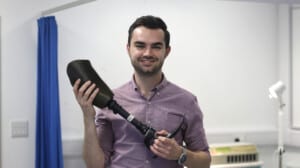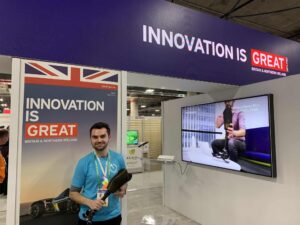Radii Devices
ORUK invests in start-up business applying cutting-edge technology to improve the fit of prosthetics.
ORUK has taken an equity stake in Radii Devices, a start-up company that uses state-of-the-art AI and biomechanical modelling to help clinicians design better fitting prosthetic sockets for people with limb loss or limb difference. The company was founded by University of Southampton postgraduate, Dr Josh Steer, who says that designers of prosthetic limbs ‘should have access to the same technology as Formula 1 or NASA engineers’.
The socket between the patient’s limb and a prosthetic is often a source of pain and discomfort and can sometimes even prevent the user from walking. Every patient is unique, so the sockets have to be custom made to each individual and the external shape of the patient’s limb often changes over time, making the fitting of prosthetics a time-consuming process. Following amputation, up to nine clinical visits are required before a comfortable fit is achieved. Radii Devices aims help clinicians design more comfortable prosthetic sockets, more efficiently, by providing them with analytical data from 3D scans of thousands of procedures.
ORUK’s equity stake is match funding provided by Innovate UK’s Biomedical Catalyst programme. This investment will fund a multi-centre clinical trial of the company’s software in several clinics across the UK, to evaluate how well the software works and the quantifiable improvements that have been made.

Dr Steer welcomes ORUK becoming a shareholder and sees the benefits that it brings beyond funding, especially the access it opens-up to extensive expertise and connections at the interface of medicine, medical engineering and computer science.
‘Much work has been done in engineering design over the last few decades around design optimization and we’re at the point where you can bring a lot of these technologies together. We are also working through challenges such as data access and patient consent and our relationship with ORUK allows us to be actively involved in the debate.’
Dr Arash Angadji, CEO of Orthopaedic Research UK, added:
“We invest in start-up businesses such as Radii Devices, that have a sound business model and a smart technological solution that is capable of delivering real benefits within a relatively short time-frame. By helping to commercialise innovative ideas we benefit patients and potentially generate revenue that can be reinvested in supporting our charitable activities and increasing our overall impact’
Around 8,000 lower limb prosthetic procedures are undertaken every year in the UK and demand is growing, largely because of the rise in diabetes. Radii Devices has ambitious plans to expand into new territories, such as North America (where there is an enormous demand for prosthetics), and also into new areas of medicine. The company believes that its biomechanical modelling can be applied to other areas of medicine in which external medical devices are attached to the skin, including orthotics and the fitting of respiratory masks.
